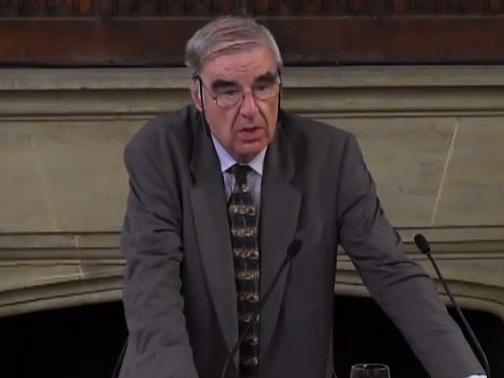Sir Nicholas Wall: Inquest to be held into top judge’s suicide after dementia diagnosis
UK's most senior expert in family law took his own life on 17 February aged 71 after doctors found he was suffering from rare neurological disease

Your support helps us to tell the story
From reproductive rights to climate change to Big Tech, The Independent is on the ground when the story is developing. Whether it's investigating the financials of Elon Musk's pro-Trump PAC or producing our latest documentary, 'The A Word', which shines a light on the American women fighting for reproductive rights, we know how important it is to parse out the facts from the messaging.
At such a critical moment in US history, we need reporters on the ground. Your donation allows us to keep sending journalists to speak to both sides of the story.
The Independent is trusted by Americans across the entire political spectrum. And unlike many other quality news outlets, we choose not to lock Americans out of our reporting and analysis with paywalls. We believe quality journalism should be available to everyone, paid for by those who can afford it.
Your support makes all the difference.An inquest will be held into the suicide of Sir Nicholas Wall, who was once Britain's most senior family law judge, who took his own life following a recent diagnosis with dementia.
The family of Sir Nicholas - who became president of the Family Division in 2010 and retired on health grounds in December 2012 - said earlier this year that he died “by his own hand” on 17 February aged 71.
In a statement following his death in Sevenoaks, Kent, his relatives said: “Sir Nicholas took his own life having suffered for several years from a rare neurological disease called frontotemporal lobe dementia that had only recently been diagnosed.”
A death notice published in The Times newspaper was accompanied by a moving verse from Alfred, Lord Tennyson's poem 'Tithonus'.
Frontotemporal dementia is one of the less common forms of dementia and is sometimes called Pick's disease or frontal lobe dementia, according to the Alzheimer's Society.
It affects part of the brain connected to control behaviour and emotions plus the understanding of words.
Frontotemporal dementia is caused when nerve cells in the frontal and/or temporal lobes of the brain die and the pathways that connect them change.
The Family Law Bar Association (FLBA) said Sir Nicholas had “continued to struggle with ill health” since his retirement in 2012.
He was described as “a compassionate judge who thought and cared deeply about the outcome of his cases”.
Cambridge-graduate Sir Nicholas was called to the Bar in 1969 and appointed Queen's Counsel in 1988.
He became a recorder in 1990 and then a judge of the High Court Family Division in April 1993.
Sir Nicholas worked at the Employment Appeal Tribunal, and then the Administrative Court before being promoted to the Court of Appeal in January 2004.
In 2011, he said a “live-in lovers” law would protect women in long-term relationships from losing their home and income in a break-up with their partner.
He also said couples should be allowed to divorce without having to blame one or the other, adding he could “see no good arguments against no-fault divorce”.
Sir Nicholas is survived by his wife Margaret, his children Imogen, Emma, Rosalind and Simon and his grandsons Joshua and Arthur.
The inquest will be held at the Archbishop's Palace in Maidstone from 10am on Wednesday.
Press Association
Join our commenting forum
Join thought-provoking conversations, follow other Independent readers and see their replies
Comments